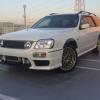Price Guide - Pfc Tuning
Announcements
-
Similar Content
-
Latest Posts
-
There's one for sale at Grand Auto Wreckers in Lonsdale (SA), for .... let's suggest the sum they're asking for will make you cry. You may have to embrace the idea of modifying the rear subframe to accept some other diff. You could probably find a way to wangle a shortnose into there, with a custom rear adapter and some sort of shenanigans to relocate the front mounts. This has probably already been done by others, so there might be some guidance available as to how easy/impossible it is, out there in the googles. But you possibly needn't restrict yourself to Nissan diffs if you're going to contemplate that. There are similarish Toyota diffs, possibly some Euro ones, possibly some Seppo ones.
-
The ball joint taper and arm taper have to match angle and diameter, but just doing the bushes is a much better option.....seems like the industry moved to "it is cheaper to replace the whole arm than take on the labour for changing this bushes", glad the aftermarket supports it
-
Gee she looks a bit rear heavy in that first pic! Sounds like a great project with the kids, but as I guess you know R series stuff is getting hard to find and pre that is pretty much impossible these days
-
By Julsmadrid · Posted
Thanks GTSboy. I will inspect the valves actually, is this something I can do while they are still in the head? The block/bores don’t look bad to be honest hey, I can still see the cross hatches in the bores and they still measure 86.5mm. I’m not sure how to measure the installed ring gaps but I will do that and take it to someone who can. -
I’ve had the same headache with my lowered car, scissor jack first then floor jack every time. Ended up grabbing an extra-low profile aluminum jack (about 70mm entry height) and it finally slides under the lip without drama.
-



1.thumb.png.36afd656b26d55f5d425fc76e21561f2.png)

Recommended Posts
Create an account or sign in to comment
You need to be a member in order to leave a comment
Create an account
Sign up for a new account in our community. It's easy!
Register a new accountSign in
Already have an account? Sign in here.
Sign In Now